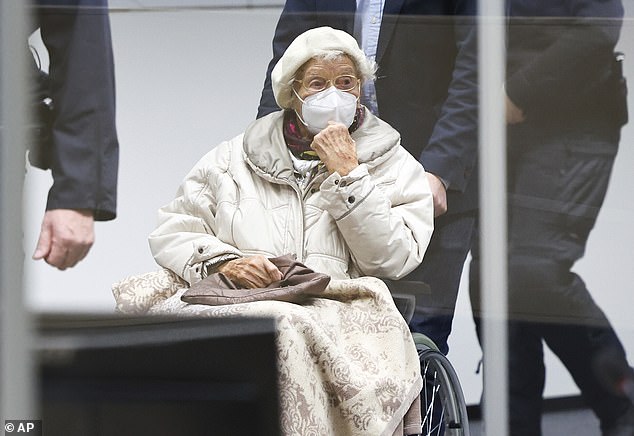A 99-year-old Nazi known as the “Secretary of Evil” has failed in her bid to overturn a conviction for being complicit in more than 10,000 murders at the infamous Stutthof concentration camp during World War II.
Germany’s Federal Court of Justice has upheld the sentence imposed on Irmgard Furchner, who was secretary to the SS commander of the concentration camp on Poland’s northern coast.
An estimated 63,000 to 65,000 people, including Jews, political prisoners, suspected criminals, homosexuals and Jehovah’s Witnesses, were massacred at the camp between 1939 and 1945.
She was accused of being part of the apparatus that helped run the camp near Danzig, today the Polish city of Gdansk. She was convicted of complicity in 10,505 cases of murder and complicity in attempted murder in five cases.
At a hearing before a federal court in Leipzig last month, the Nazi’s lawyers sought to cast doubt on whether she could really be considered complicit in the atrocities committed at the camp and whether she had been fully aware of what was happening.
Germany’s Federal Court of Justice has upheld the conviction of Irmgard Furchner (pictured), who was secretary to the SS commander of the infamous Stutthof concentration camp.

It is estimated that between 63,000 and 65,000 people died in Stutthof during World War II.

Furchner (pictured in 1944) was 18 or 19 years old when she worked as a secretary in the field.
She was tried in juvenile court because she was 18 and 19 at the time of the alleged crimes, and the court could not establish beyond a doubt her “mental maturity” at the time.
But the court ruled that Furchner “knew and, through her work as a stenographer in the commandant’s office of the Stutthof concentration camp from June 1, 1943, to April 1, 1945, deliberately supported the fact that 10,505 prisoners were cruelly murdered by gassing, hostile conditions in the camp,” by transportation to the Auschwitz extermination camp and by being sent on death marches at the end of the war.
In September 2021, German police detained her for several days after she tried to flee at the start of her trial.
Furchner fled his home in Norderstedt in northern Germany and tried to take a taxi to the town’s train station, but did not get far.
She was detained for five days and the start of the trial was delayed due to her escape attempt.

In September 2021, German police detained her for several days after she tried to flee at the start of her trial.

The Furchner case may be one of the last cases of Nazi war crimes to be carried out.

A view of the former Nazi extermination camp at Stutthof
Although he remained apparently silent for much of the trial, he said toward the end: “I regret everything that happened. I regret that I was in Stutthof at that time. I can’t say anything more.”
The Furchner case may be one of the last Nazi war crimes cases to come to fruition.
TO The special federal prosecutor’s office in Ludwigsburg, which is charged with investigating Nazi-era war crimes, says there are only three more cases pending before prosecutors or courts in various parts of Germany.
Many Nazis who participated in the systematic murder of millions of people during the Holocaust are now dead or near the end of their lives, raising questions about whether they are fit to stand trial.
Furchner’s confirmed conviction is one of several in the past decade that are based on a 2011 legal precedent that established that helping run a concentration camp was enough to be an accessory to murder.

The camp was run by the Nazis from the beginning of World War II.

Stutthof has now been converted into a museum to ensure that the memory of the Holocaust lives on.
The landmark case saw former Ohio autoworker John Demjanjuk convicted for his role as a guard at the Sobibor death camp in eastern Poland.
Demjanjuk, who denied the allegations, died before his appeal could be heard.
Previously, German courts required prosecutors to justify charges by presenting evidence of a former guard’s involvement in a specific murder, an often near-impossible task.
However, prosecutors in the 2011 case successfully argued that helping run a camp was enough to convict someone of being an accessory to murders committed there.
A federal court later upheld the 2015 conviction of former Auschwitz guard Oskar Groening on the same grounds.


